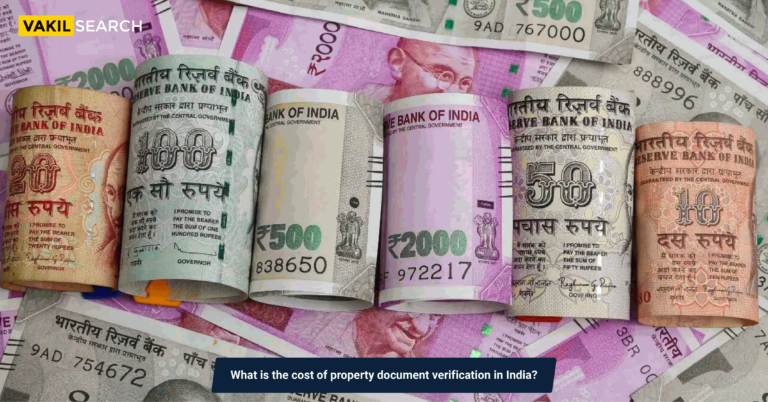In this article we will take a look at the quintessential documents one must verify prior to purchasing a property that is under construction.
Legal Documents To Check purchase Under Construction Property
There are very few assets that appreciate in value over time rather than depreciate. One such asset is land and property. There was a time when property was purchased for personal residence or personal use. These days, property is a commodity in which people invest solely for the purpose of reselling and making a profit out of the transaction. And one of the best ways to ensure return on investment in this market is to purchase property that is under construction. This is a classic case of the proportionality of risk and reward.
When a real estate developer begins constructing a project, there is a huge risk in terms of whether there will be any takers for the project once it has been constructed. That is the risk the builder takes. So when you purchase a property that is still under construction, you are mitigating that much risk from the developer and taking it on your own head. Many developers offer good discounts if someone is willing to commit to the purchase of a property while it is still under construction. It is an incentive for prospective purchaseers while at the same time it mitigates the developers risk onto the purchaseer. The purchase can then sell the property once it is ready at a profit.
But the thing with property is that it is an immovable asset. Unlike other assets, which you can take along with you once you have purchased it, property remains where it was when you bought it and will remain there as such. So the only way to prove ownership or possession of a property is the paperwork. So it is always important to ensure that all the paperwork regarding the property are in order before they purchase a property, especially one under construction. Let us take a look at the list of documents.
Documents To Check Before Purchase Property
-
Title Deed
This document will tell you whether the builder owns the property being sold and has the right to sell the property and the freedom to transfer ownership. Insist on seeing the original, and not a copy of the title deed. It will also tell you whether everything is legal or if there is litigation in progress regarding the property. A purchaser should check the original deed and confirm that the land is in the name of the developer, and that no one else has the right to sell it. It is advisable to get the title reviewed by a lawyer.
-
Intimation Of Disapproval (IOD)
This is a set of permissions which must be obtained by a developer at various stages of construction. This would involve acquiring approvals and a No Objection Certificate (NOC) from various departments such as the Storm Water and Drain Department, Sewage Departments, Forest Department, Environment Department, Traffic and Coordination Department, Chief Fire Officer, Airport Authority and Pollution Board, among others. It is called a letter of disapproval because the letter is drafted only in the event of a disapproval. If the plans and construction project is approved, then the regulatory authority will simply issue a certificate of no-objection.
-
Commencement Certificate (CC)
This is a document which must be issued by the local authorities and legally allows a builder to start the actual construction work. This is important as any construction without procuring a CC is illegal.
-
Encumbrance Certificate
This can be obtained from the office of the registration authority (the sub registrar’s office) and tells you whether the property carries any legal or monetary liabilities or has any litigation pending. It can go as far back as 30 years.
-
Approved Layout Plans
The layout plans must be approved by the appropriate planning authorities. Home purchasers need to exercise caution as there have been cases where developers deviated from the approved layouts, by adding extra floors or reducing open areas.
-
Purchase Agreement
You should go through this document carefully to make sure it includes everything you were promised. You can only hold a builder or promoter legally accountable for what is in the purchase agreement, not what has been verbally promised to you. The agreement should contain all major details of the construction project such as the project specification, apartments, payment terms, completion deadlines and the type and amount of penalty, should any party default. The agreement should also contain a clause to transfer the common areas to the society. This ensures the plot remains with the original owners and that the developer cannot engage in further construction on this land.
-
Occupancy Certificate
Issued by local authorities, this certificate states that the property has been constructed in compliance with the provided permissions. At this stage the developer would have completed all necessary water, sewage and electrical connections.
The amount of paperwork that goes into a property related transaction can bury a person under its weight. This is the reason why property Verification law is a specialisation in the legal fraternity. It not only requires knowledge of the law, the local municipal regulations and the formalities. It also requires acute attention to detail given that purchase agreements and title deeds can go on for pages and pages with every minute detail regarding the property covered within. If you have any queries regarding property law or need help with regards to property related matter, then get in touch with us so that our team of property law experts can get in touch with you to understand your requirements and address your needs.
Frequently Asked Questions
Why is the sale agreement an important legal document for under-construction properties?
The sale agreement is crucial for under-construction properties as it outlines terms, conditions, and timelines, protecting both the buyer and the developer. It legally binds the parties, ensuring transparency and safeguarding against potential disputes during the property's construction and eventual possession.
What is the significance of the building plan approval in the legal documentation process?
Building plan approval is pivotal in the legal documentation process for under-construction properties. It ensures that the construction adheres to local regulations and safety standards. Securing this approval is essential for validating the property's legality and confirming that it meets the specified architectural and structural requirements.
How does the commencement certificate play a role in verifying the legality of under-construction properties?
The commencement certificate is instrumental in verifying the legality of under-construction properties. Issued by local authorities, it confirms that construction has begun in compliance with approved plans. This certificate is a crucial checkpoint in ensuring that the property development aligns with the sanctioned specifications.
What legal checks should I perform on the title deed of an under-construction property?
Thorough legal checks on the title deed are essential when dealing with under-construction properties. It confirms the developer's ownership rights and ensures that the property is free from encumbrances or legal disputes. Examining the title deed meticulously is a critical step in safeguarding the buyer's long-term interests.
Is it essential to examine the occupancy certificate when buying an under-construction property?
Examining the occupancy certificate is imperative when purchasing an under-construction property. This document, issued by local authorities, verifies that the property complies with all building codes and is fit for habitation. It assures the buyer that the construction has met all legal standards, promoting a secure and lawful occupancy.
What is the role of the No Objection Certificate (NOC) in the legal verification process?
The No Objection Certificate (NOC) is a crucial aspect of legal verification for under-construction properties. It ensures that the developer has obtained necessary clearances from local authorities, confirming compliance with zoning regulations and environmental norms. The NOC is a testament to the property's legality and adherence to regulatory requirements.
How does the Completion Certificate contribute to the legal due diligence for under-construction properties?
The Completion Certificate holds significance in the legal due diligence for under-construction properties. Issued upon project completion, it attests that the construction aligns with approved plans and meets statutory requirements. This document is vital for validating the property's legality and facilitating a seamless handover to the buyer.
What legal protections does the buyer have in case of delays or discrepancies in the under-construction property?
Buyers of under-construction properties have legal protections in case of delays or discrepancies. The sale agreement typically includes clauses specifying penalties for delays, providing recourse for the buyer. Legal provisions exist to address construction defects, ensuring that buyers can seek redress and protect their investment.
Is it advisable to seek legal assistance or hire a property lawyer to ensure a comprehensive review of all relevant legal documents before making a purchase?
Seeking legal assistance or hiring a property lawyer is highly advisable for a comprehensive review of all relevant legal documents before purchasing an under-construction property. A legal expert can navigate complexities, ensuring that the buyer understands the implications of each document, minimising risks, and safeguarding their interests in the property transaction.
Read More,
- How to Verify Property Documents Without a Lawyer?
- How Land Is Registered In India?
- What is Need for Property Registration Online?










